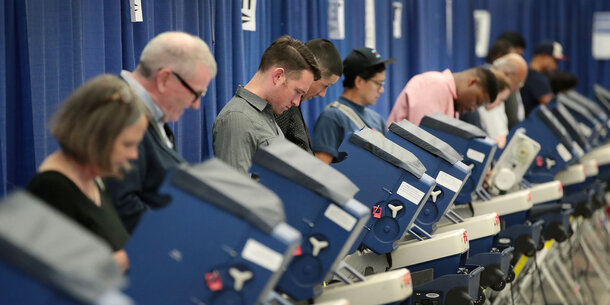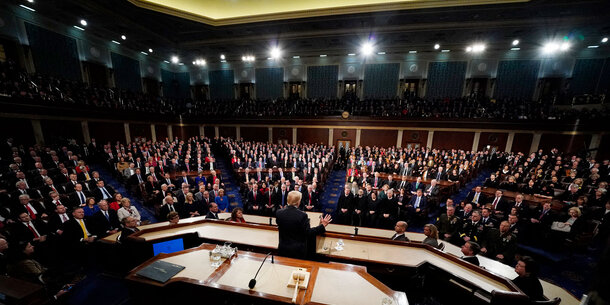Amid sweeping voter suppression efforts across the country, Georgia has emerged as a flashpoint in recent weeks, introducing legislation to eliminate early in-person voting on Sundays and to eliminate no-excuse absentee voting for younger voters, among other measures. The Brennan Center has found that these anti-voter bills would disproportionately hurt Black voters.
These efforts in Georgia are unfolding as state lawmakers across the country advance aggressive legislation that would make it harder to vote — and at breakneck speed, according to another Brennan Center analysis — raising the stakes for Congress to pass federal reforms such as the John Lewis Voting Rights Advancement Act and For The People Act.
What’s the nature of the restrictive voting laws under consideration in Georgia?
Myrna Pérez: Georgia is a story of changing political power. In recent years, communities of color in the state have gotten extraordinarily effective at making their political voices known at the ballot box. We are seeing politicians who feel threatened by those changes and, in response, are attempting to pass a wave of restrictive voting laws.
One example is a bill that would limit no-excuse absentee voting — a program that has been in place in Georgia for more than a decade and was traditionally very popular with white and Republican voters in the state. But in 2020, the racial disparity in its usage shrunk significantly. In response, there are now multiple efforts attempting to end the use of no-excuse absent ballots in Georgia. And of course, these limits are being targeted in a way that will disproportionately hurt voters of color.
Another restriction that is getting a lot of notoriety is the cutting back or elimination of Sunday voting. Sunday is a popular day for churches, especially Black churches, to ensure that their parish members or congregants are able to get to the voting booth through programs affectionately called “souls to the polls.” These programs are clearly effective and turning out voters because people are trying to thwart them. But there isn’t an election security, integrity, or accuracy rationale for telling people that they can’t vote on Sunday.
What has the Brennan Center’s research found about the history of long lines at the polls in Georgia?
Pérez: We analyzed the 2018 election and found that voters of color had to wait longer in line at the polls. Additionally, communities undergoing rapid demographic changes had fewer resources per voter at the polls. In other words, there was a failure of jurisdictions to catch up with what their electorate looked like. We saw this in really stark measures when we saw long lines during the 2020 presidential primaries, much of which took place during the Covid-19 pandemic. A long line might discourage or disenfranchise voters during a normal election, but it can be deadly during a pandemic that involves a virus transmitted by air.
Various factors contribute to long lines at polling places. Certainly, voter suppression efforts like the ones we’re seeing in Georgia — such as attempts to impose restrictions that cut back on early voting days or force more people to go to the polls on Election Day — are only going to exacerbate the problem. That’s why the proposed ban on providing modest snacks and drinks to people waiting in line is such a dig to voting rights groups.
How do the proposed voting restrictions build on and perpetuate the myth of voter fraud?
Pérez: We are seeing politicians continue to propagate the Big Lie that there was widespread voter fraud during the November 2020 election. It’s clear that some politicians in Georgia would prefer to manipulate the rules of the game — so that some voters can participate and some voters can’t — rather than to compete for votes. And that is backwards. Voters should be choosing their politicians, not the other way around.
What we actually saw in Georgia during the 2020 election was massive turnout under really trying conditions. Georgia voters said in a very clear voice that they cared about their right to vote, and that they were going to exercise it. And the reaction to that reflected much of the rhetoric that inspired the violent insurrection that we saw earlier in the year. It’s a terrible feedback loop, where the same politicians who were undermining our electoral system are now pushing for restrictive voting laws, based on the justification that people don’t trust that system. But voters lose faith and trust in the system when they see politicians manipulating it to keep themselves in power.
How might federal reforms address the voter suppression efforts we’re seeing in states like Georgia?
Pérez: There are two important federal pieces of legislation that need to be part of the discussion. One is the John Lewis Voting Rights Advancement Act, which would help protect voters from racial discrimination and vote suppression by restoring and strengthening the protections of the Voting Rights Act. Additionally, the For The People Act (H.R. 1 in the House and S. 1 in the Senate), which deals with a lot of nuts-and-bolts election administration issues, sets a minimum floor for access to federal elections for Americans, irrespective of what state they live in. If enacted, it would make voting more accessible.




